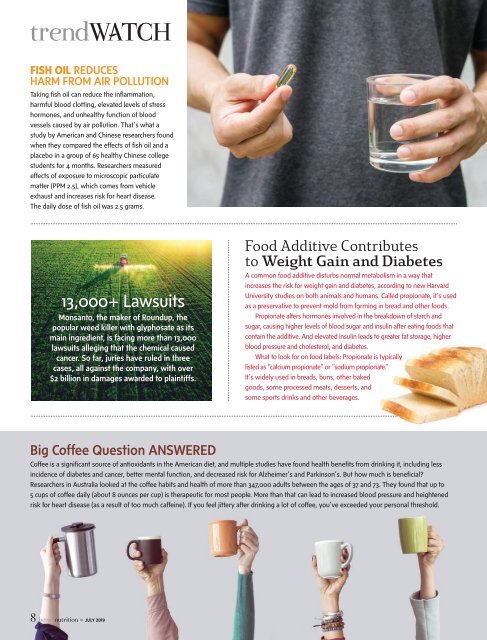You also want an ePaper? Increase the reach of your titles
YUMPU automatically turns print PDFs into web optimized ePapers that Google loves.
trendWATCH<br />
FISH OIL REDUCES<br />
HARM FROM AIR POLLUTION<br />
Taking fish oil can reduce the inflammation,<br />
harmful blood clotting, elevated levels of stress<br />
hormones, and unhealthy function of blood<br />
vessels caused by air pollution. That’s what a<br />
study by American and Chinese researchers found<br />
when they compared the effects of fish oil and a<br />
placebo in a group of 65 healthy Chinese college<br />
students for 4 months. Researchers measured<br />
effects of exposure to microscopic particulate<br />
matter (PPM 2.5), which comes from vehicle<br />
exhaust and increases risk for heart disease.<br />
The daily dose of fish oil was 2.5 grams.<br />
13,000+ Lawsuits<br />
Monsanto, the maker of Roundup, the<br />
popular weed killer with glyphosate as its<br />
main ingredient, is facing more than 13,000<br />
lawsuits alleging that the chemical caused<br />
cancer. So far, juries have ruled in three<br />
cases, all against the company, with over<br />
$2 billion in damages awarded to plaintiffs.<br />
Food Additive Contributes<br />
to Weight Gain and Diabetes<br />
A common food additive disturbs normal metabolism in a way that<br />
increases the risk for weight gain and diabetes, according to new Harvard<br />
University studies on both animals and humans. Called propionate, it’s used<br />
as a preservative to prevent mold from forming in bread and other foods.<br />
Propionate alters hormones involved in the breakdown of starch and<br />
sugar, causing higher levels of blood sugar and insulin after eating foods that<br />
contain the additive. And elevated insulin leads to greater fat storage, higher<br />
blood pressure and cholesterol, and diabetes.<br />
What to look for on food labels: Propionate is typically<br />
listed as “calcium propionate” or “sodium propionate.”<br />
It’s widely used in breads, buns, other baked<br />
goods, some processed meats, desserts, and<br />
some sports drinks and other beverages.<br />
Big Coffee Question ANSWERED<br />
Coffee is a significant source of antioxidants in the American diet, and multiple studies have found health benefits from drinking it, including less<br />
incidence of diabetes and cancer, better mental function, and decreased risk for Alzheimer’s and Parkinson’s. But how much is beneficial?<br />
Researchers in Australia looked at the coffee habits and health of more than 347,000 adults between the ages of 37 and 73. They found that up to<br />
5 cups of coffee daily (about 8 ounces per cup) is therapeutic for most people. More than that can lead to increased blood pressure and heightened<br />
risk for heart disease (as a result of too much caffeine). If you feel jittery after drinking a lot of coffee, you’ve exceeded your personal threshold.<br />
8 • JULY <strong>2019</strong>

















